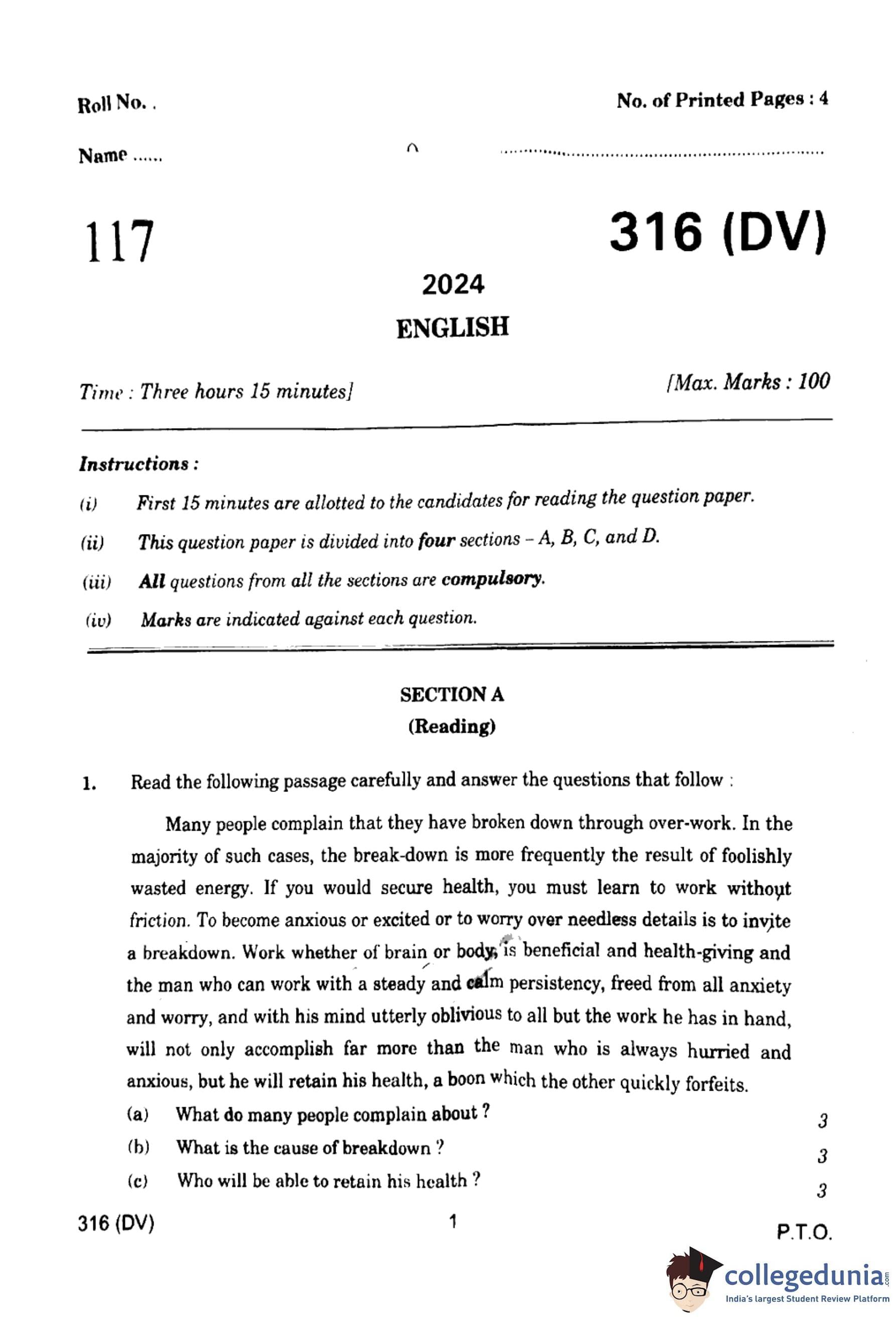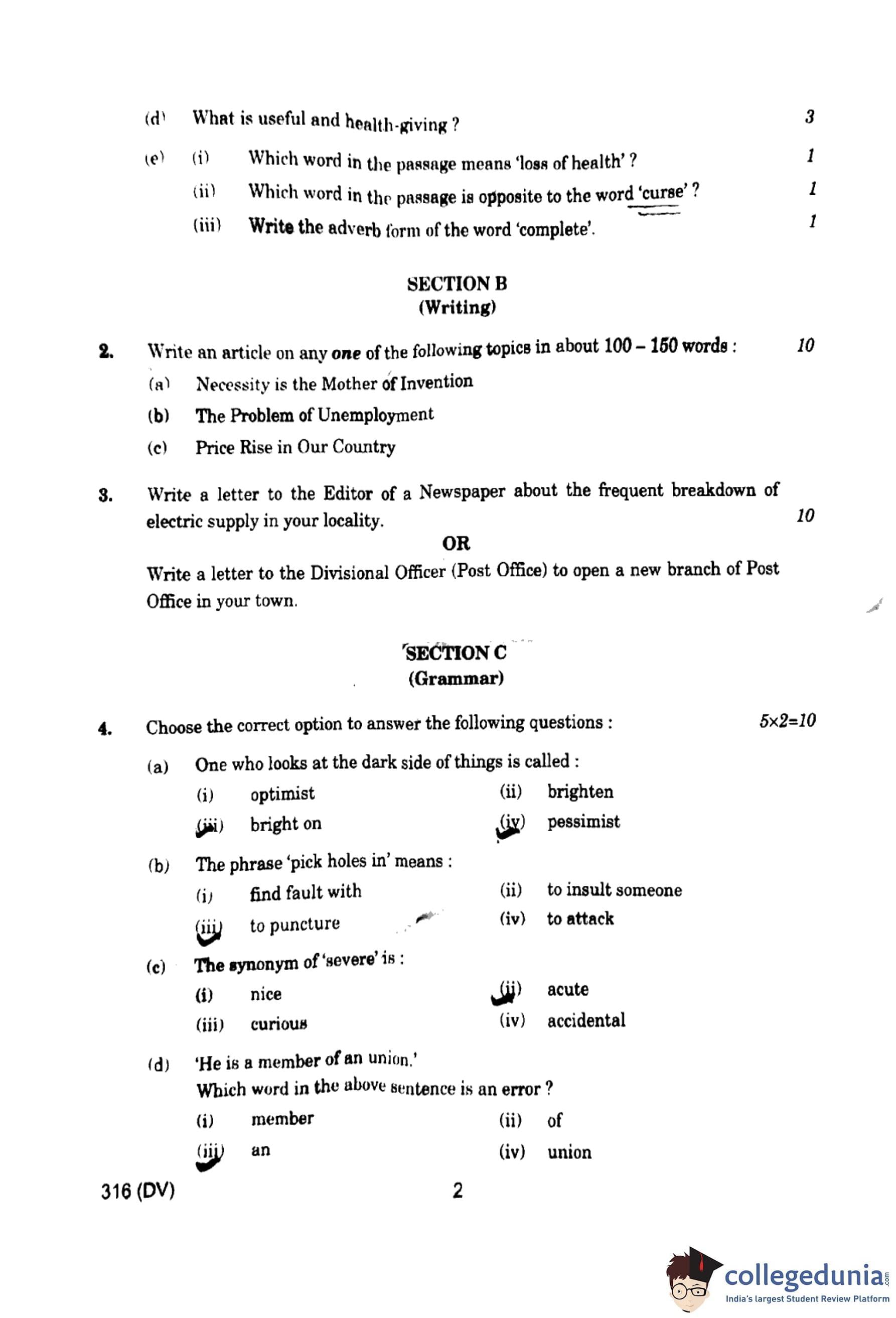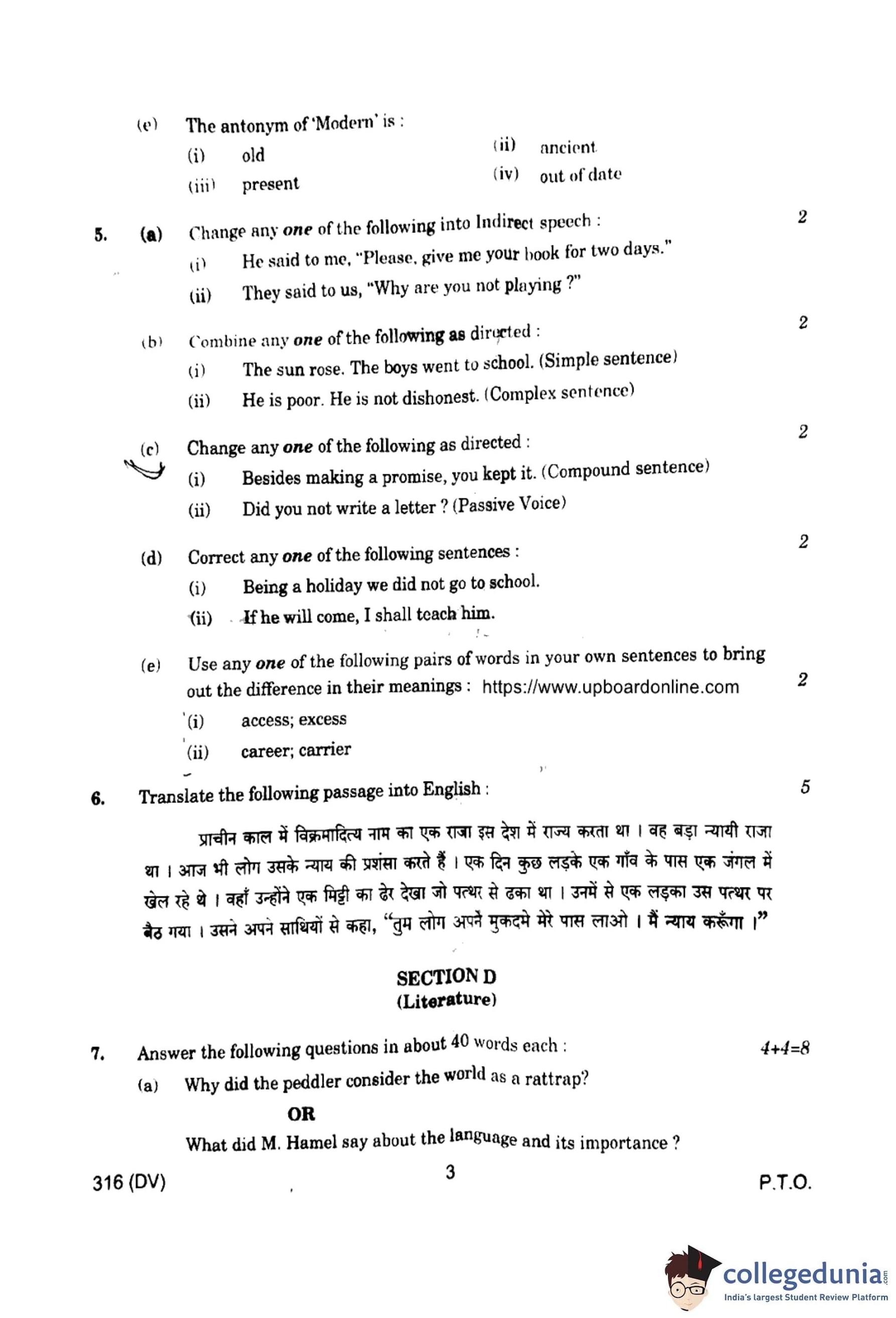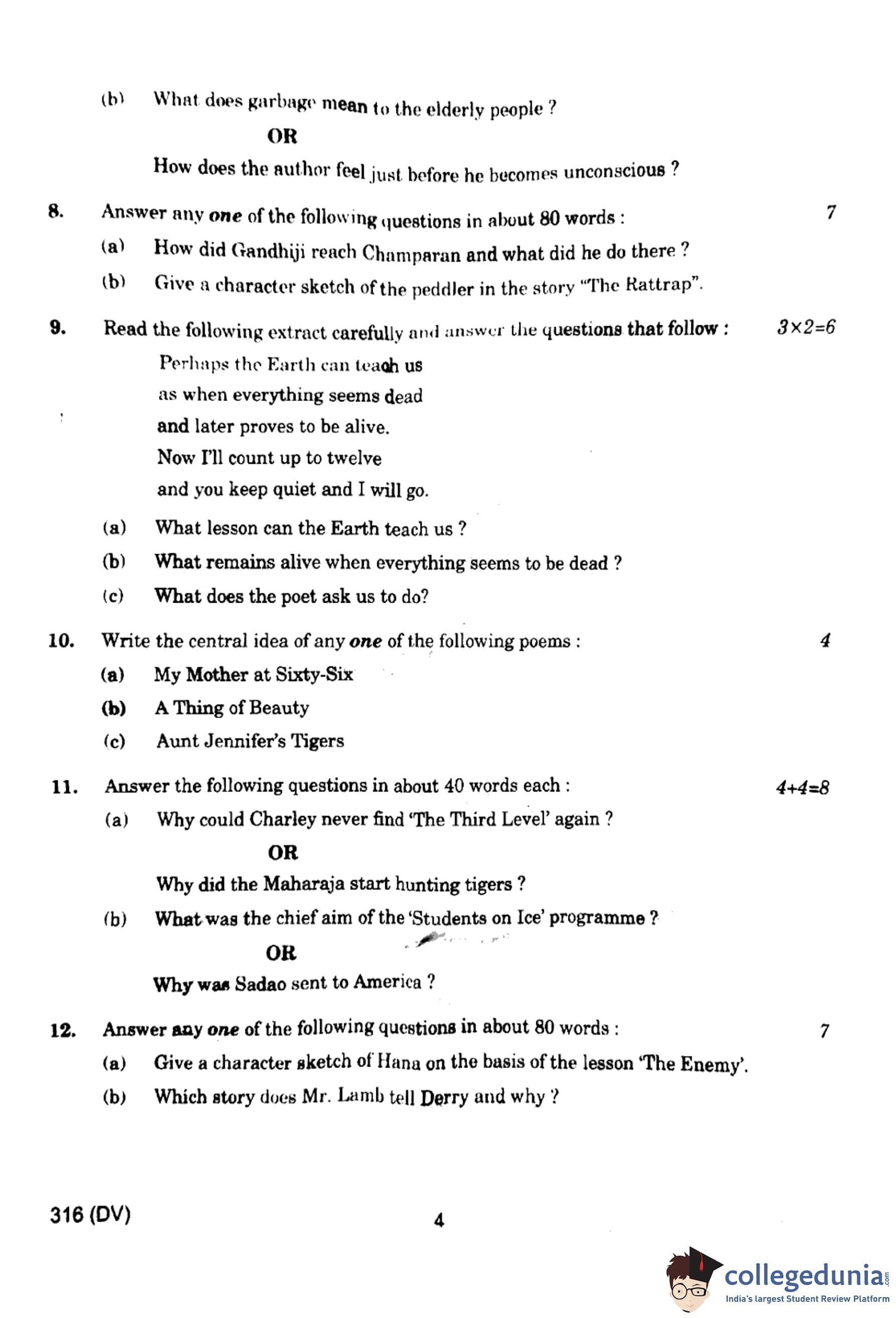UP Board Class 12 English Question Paper 2024 PDF (Code 316 DV) is available for download here. The English exam was conducted on March 2, 2024 in the Evening Shift from 2 PM to 5:15 PM. The total marks for the theory paper are 100. Students reported the paper to be easy to moderate.
UP Board Class 12 English Question Paper 2024 (Code 316 DV) with Solutions
| UP Board Class 12 English Question Paper with Answer Key | Check Solution |
UP Board Class 12 English Questions with Solutions
Question 1:
Many people complain that they have broken down through over-work. In the majority of
such cases, the break-down is more frequently the result of foolishly wasted energy.
Read More
If you
would secure health, you must learn to work without friction. To become anxious or excited
or to worry over needless details is to invite a breakdown. Work whether of brain or body is
beneficial and health-giving and the man who can work with a steady and calm persistency,
free from all anxiety and worry, and with his mind utterly oblivious to all but the work he has
in hand, will not only accomplish far more than the man who is always hurried and anxious,
but he will retain his health, a boon which the other quickly forfeits.
(a) What do many people complain about?
View Solution
The passage mentions that people often attribute their breakdowns to excessive work, but the real cause is the improper use of energy.
Quick Tip: Focus on the distinction between overwork and mismanagement of energy.
(b) What is the cause of breakdown?
View Solution
According to the passage, breakdown occurs due to unnecessary anxiety and worrying over minor details, which leads to energy depletion.
Quick Tip: Identify key points that explain the main cause of breakdown.
(c) Who will be able to retain his health?
View Solution
The passage states that a calm and persistent worker who remains focused on his work without worry will achieve more and stay healthy.
Quick Tip: Look for contrasting behaviors in the passage to find the answer.
(d) What is useful and health-giving?
View Solution
The passage highlights that consistent and focused work without worry contributes to good health and productivity.
Quick Tip: Identify key phrases that emphasize the benefits of work.
(e) (i) Which word in the passage means ‘loss of health’?
View Solution
The word "breakdown" in the passage is used to describe a state of losing health due to anxiety and wasted energy.
Quick Tip: Look for context clues to find synonyms in the passage.
(e) (ii) Which word in the passage is opposite to the word ‘cure’?
View Solution
The passage contrasts breakdown with the idea of maintaining health, making it the opposite of 'cure'.
Quick Tip: Consider antonyms related to health and well-being.
(e) (iii) Write the adverb form of the word ‘complete’.
View Solution
The adverb form of the adjective ‘complete’ is ‘completely’, which means in a thorough or total manner.
Quick Tip: Use suffix rules to derive adverbs from adjectives.
Write an article on any one of the following topics in about 100 - 150 words:
(a) Necessity is the Mother of Invention
View Solution
Necessity has always been the driving force behind human progress. When faced with challenges, people find innovative Solutions to overcome them. History provides many examples—whether it be the invention of the wheel to ease transportation or modern technology solving everyday problems. During difficult times, the human mind is compelled to think creatively and develop new ideas. In today's world, technological advancements are a result of necessity-driven innovation. Whether in medicine, engineering, or space exploration, human creativity is ignited by pressing needs. Therefore, necessity indeed acts as the catalyst for all great inventions. Quick Tip: Provide examples from history to support your article.
(b) The Problem of Unemployment
View Solution
Unemployment is a serious issue affecting millions of people worldwide. It leads to financial insecurity, social unrest, and mental stress. Factors such as population growth, lack of education, and technological advancements replacing manual labor contribute to the problem. Governments should focus on skill development programs and entrepreneurship initiatives to create more job opportunities. The youth must also seek self-employment and innovation to combat job shortages. Addressing unemployment requires collective efforts from the government, private sector, and individuals alike. Quick Tip: Discuss causes, effects, and possible Solutions concisely.
(c) Price Rise in Our Country
View Solution
Price rise is a major economic challenge that affects the common man. Essential commodities such as food, fuel, and medicines are becoming increasingly expensive, making it difficult for people to meet their daily needs. The primary causes of price rise include inflation, high production costs, and supply chain disruptions. The government should implement effective policies to control inflation and stabilize prices. Citizens can also contribute by avoiding wastage and promoting local products to reduce dependency on imports. Quick Tip: Include economic factors and government measures in your response.
Write a letter to the Editor of a Newspaper about the frequent breakdown of electric supply in your locality.
View Solution
Sample letter provided below.
To,
The Editor,
The Daily Herald,
[Your City]
Subject: Frequent breakdown of electric supply in our locality.
Sir/Madam,
Through the esteemed columns of your newspaper, I wish to draw the attention of the concerned authorities to the frequent breakdown of electricity in our locality. Due to power cuts, students face difficulty in studying, businesses suffer, and daily life is severely disrupted. The situation worsens during extreme weather conditions, making it unbearable for residents. Despite several complaints, no action has been taken to resolve the issue.
I urge the concerned department to take immediate steps to improve the power infrastructure and ensure an uninterrupted electricity supply. Your efforts in highlighting this matter will be greatly appreciated.
Yours sincerely,
[Your Name]
[Your Address]
Quick Tip: Mention specific issues faced and request a Solution.
Write a letter to the Divisional Officer (Post Office) to open a new branch of Post Office in your town.
View Solution
Sample letter provided below.
To,
The Divisional Officer,
Postal Department,
[Your City]
Subject: Request for opening a new Post Office branch in our town.
Sir/Madam,
I am writing to request the opening of a new post office branch in our town. The current post office is located far from residential areas, causing inconvenience to the elderly and working professionals. The increasing population demands better postal services, and the existing facility is unable to handle the growing number of residents efficiently.
I request you to consider our plea and open a new post office branch to cater to the needs of the residents. We hope for a favorable response and prompt action from your department.
Yours sincerely,
[Your Name]
[Your Address]
Quick Tip: Provide valid reasons for requesting a new post office.
(a) One who looks at the dark side of things is called:
(i) optimist
(ii) brighten
(iii) pessimist
(iv) optimist
View Solution
A pessimist is someone who tends to see the negative side of things, while an optimist sees the positive side. Quick Tip: Understand the difference between optimistic and pessimistic viewpoints.
(b) The phrase 'pick holes in' means:
(i) to insult someone
(ii) to find fault with
(iii) to puncture
(iv) to attack
View Solution
The phrase "pick holes in" means to criticize or find faults in something. Quick Tip: Familiarize yourself with common idioms and their meanings.
(c) The synonym of 'severe' is:
(i) nice
(ii) acute
(iii) curious
(iv) accidental
View Solution
The word "acute" means intense or severe in degree, making it the closest synonym for "severe." Quick Tip: Pay attention to words with similar meanings in different contexts.
(d) ‘He is a member of an union.’ Which word in the above sentence is an error?
(i) member
(ii) of
(iii) an
(iv) union
View Solution
The correct article should be "a" instead of "an" because "union" starts with a consonant sound. Quick Tip: Choose articles based on pronunciation rather than spelling.
(e) The antonym of 'Modern' is:
(i) old
(ii) ancient
(iii) present
(iv) out of date
View Solution
The word "ancient" is the opposite of modern, referring to something very old or from the past. Quick Tip: Consider historical context when selecting antonyms.
(i) He said to me, "Please, give me your book for two days."
View Solution
He requested me to give him my book for two days. Quick Tip: Convert requests in direct speech to "requested" in indirect speech.
(ii) They said to us, "Why are you not playing?"
View Solution
They asked us why we were not playing. Quick Tip: Change question verbs accordingly in indirect speech.
(i) The sun rose. The boys went to school. (Simple sentence)
View Solution
When the sun rose, the boys went to school. Quick Tip: Use conjunctions to combine sentences smoothly.
(ii) He is poor. He is also dishonest. (Complex sentence)
View Solution
Although he is poor, he is also dishonest. Quick Tip: Use subordinating conjunctions to form complex sentences.
(i) Besides making a promise, you kept it. (Compound sentence)
View Solution
You made a promise, and you kept it. Quick Tip: Connect independent clauses using coordinating conjunctions.
(ii) Did you not write a letter? (Passive voice)
View Solution
Was a letter not written by you? Quick Tip: Remember to adjust verb forms correctly in passive voice.
(i) Being a holiday we did not go to school.
View Solution
As it was a holiday, we did not go to school. Quick Tip: Ensure clarity and avoid sentence fragments.
(ii) If he will come, I shall teach him.
View Solution
If he comes, I shall teach him. Quick Tip: Avoid using "will" in conditional clause structures.
(i) Access --- Excess
View Solution
1. He was granted access to the restricted area.
2. Eating in excess can lead to health issues. Quick Tip: Understand contextual usage to differentiate homophones.
(ii) Career --- Carrier
View Solution
1. She has chosen a career in medicine.
2. The carrier transported goods across the country. Quick Tip: Career refers to a profession, while carrier means a vehicle or person that transports things.
Translate the following passage into English:
In ancient times, there was a king named Vikramaditya who ruled a country. He was a very just king, and people still praise his justice. One day, he was passing through a village and saw an old woman crying in the corner of a street. A cat had eaten the old woman's parrot. She went to the king and sat on his throne. She said, "O king, provide me justice."
View Solution
The passage describes the just nature of King Vikramaditya and how people sought justice from him in ancient times. The old woman, seeking justice for the loss of her parrot, approached the king directly, highlighting his fairness and accessibility. Quick Tip: Maintain the essence of the original text while ensuring grammatical accuracy in translation.
(a) Why did the peddler consider the world as a rattrap?
View Solution
The peddler believed that the world was like a rattrap offering material temptations, which, once accepted, trapped people in misery. He thought that riches and luxuries were baits that ensnared individuals, just as cheese traps a rat. Quick Tip: Refer to the metaphor used in the story to explain the peddler's perspective.
What did M. Hamel say about the language and its importance?
View Solution
M. Hamel emphasized that the French language was a key to unity and freedom. He urged people to cherish it as their cultural identity and a symbol of their nation’s pride, regretting that they took it for granted. Quick Tip: Mention the emotional and patriotic significance of language.
(b) What does garbage mean to the elderly people?
View Solution
To elderly people, garbage represents memories and nostalgia. It holds sentimental value as it connects them to the past, reminding them of times when they had a better and more fulfilling life. Quick Tip: Focus on how garbage represents emotional attachment for the elderly.
How does the author feel just before he becomes unconscious?
View Solution
Before becoming unconscious, the author experiences a deep sense of fear and helplessness. He feels overwhelmed, suffocated, and struggles to breathe, eventually surrendering to the situation with a sense of resignation. Quick Tip: Describe the physical and emotional state before losing consciousness.
(a) How did Gandhiji reach Champaran and what did he do there?
View Solution
Gandhiji reached Champaran after being requested by local peasants to address the exploitation by British landlords. Upon arrival, he investigated their grievances, gathered evidence, and organized peaceful protests. He fought legally and morally to abolish the oppressive indigo farming system and eventually succeeded in securing justice for the peasants. Quick Tip: Mention Gandhiji’s method of inquiry and the results of his efforts.
(b) Give a character sketch of the peddler in the story "The Rattrap".
View Solution
The peddler is a poor, lonely man who views the world cynically as a rattrap. Initially dishonest, he steals and deceives others, but later experiences kindness from Edla Willmansson, which leads to his transformation. He realizes the value of trust and redemption, ultimately becoming a better person. Quick Tip: Highlight the peddler's transformation and moral lesson.
Question 9:
Perhaps the Earth can teach us
as when everything seems dead
and later proves to be alive.
Now I’ll count up to twelve
and you keep quiet and I will go.
(a) What lesson can the Earth teach us?
View Solution
The Earth teaches us the value of renewal and continuity. It shows how everything that seems lifeless can come back to life, symbolizing hope, patience, and the power of rejuvenation. Quick Tip: Emphasize the theme of regeneration and perseverance.
(b) What remains alive when everything seems to be dead?
View Solution
Even when everything appears lifeless, the underlying processes of nature continue, and hope remains alive. The passage highlights that beneath stillness, life exists in various forms, ready to bloom again. Quick Tip: Focus on the contrast between appearance and reality in nature.
(c) What does the poet ask us to do?
View Solution
The poet asks us to remain silent and introspect, advocating for peace and unity. He urges humanity to pause, reflect on their actions, and appreciate the beauty of stillness and harmony. Quick Tip: Emphasize the importance of stillness and self-reflection.
(a) My Mother at Sixty-Six
View Solution
The poem captures the poet's emotions as she realizes her mother's aging and impending mortality. It reflects the fear of separation and the inevitable passage of time, highlighting the emotional bond between a mother and daughter. Quick Tip: Focus on the themes of love, aging, and emotional attachment.
(b) A Thing of Beauty
View Solution
The poem emphasizes that beauty is eternal and provides joy and comfort in times of sorrow. It acts as a source of hope, inspiration, and refreshment for the human soul amidst life's struggles. Quick Tip: Discuss the uplifting and eternal nature of beauty.
(c) Aunt Jennifer's Tigers
View Solution
The poem highlights the oppression faced by Aunt Jennifer in a patriarchal society. The tigers symbolize strength and freedom, contrasting with her own constrained existence, expressing her desire for liberation and empowerment. Quick Tip: Analyze the symbolism of the tigers and Aunt Jennifer’s struggle.
(a) Why could Charley never find ‘The Third Level’ again?
View Solution
Charley could never find 'The Third Level' again because it was a figment of his imagination, representing his escapism from reality. His desire to escape from the pressures of modern life led him to create an imaginary refuge, but he ultimately realized it was not real. Quick Tip: Relate the answer to the theme of escapism and fantasy versus reality.
Why did the Maharaja start hunting tigers?
View Solution
The Maharaja started hunting tigers to defy the prophecy that a tiger would be the cause of his death. In an attempt to change his fate, he made it his life's mission to kill a hundred tigers, believing it would safeguard his life from the predicted danger. Quick Tip: Mention the role of prophecy and irony in the story.
(b) What was the chief aim of the ‘Students on Ice’ programme?
View Solution
The chief aim of the ‘Students on Ice’ programme was to educate young students about climate change and its effects on the polar regions. The program provided firsthand experience to understand environmental challenges and motivated students to work towards sustainable Solutions. Quick Tip: Highlight the environmental and educational purpose of the program.
Why was Sadao sent to America?
View Solution
Dr. Sadao was sent to America to study medicine and surgery to become an expert in his field. His father believed that only the best education would help him serve his country effectively, ensuring that he gained advanced medical knowledge from a reputed institution. Quick Tip: Mention the cultural and educational expectations behind his foreign education.
(a) Give a character sketch of Hana on the basis of the lesson ‘The Enemy’.
View Solution
Hana is a kind, compassionate, and strong-willed woman who supports her husband, Dr. Sadao, in his moral dilemma of treating an enemy soldier. Despite her initial fear and societal concerns, she stands by her husband’s decision and helps in the soldier’s treatment. Her dedication to humanity is evident in the way she cares for the wounded man without prejudice. Hana’s courage and deep sense of responsibility make her an admirable character in the story. Quick Tip: Describe Hana’s empathy, strength, and moral values concisely.
(b) Which story does Mr. Lamb tell Derry and why?
View Solution
Mr. Lamb tells Derry the story of a man who was afraid of everything but was eventually killed by a beehive. He uses this story to teach Derry an important lesson—that fear should not control one’s life. Mr. Lamb encourages Derry to embrace life with confidence and to focus on his abilities rather than his physical appearance. The story helps Derry realize that fear and isolation only hinder personal growth and happiness. Quick Tip: Emphasize the moral lesson taught by Mr. Lamb in the story.










Comments